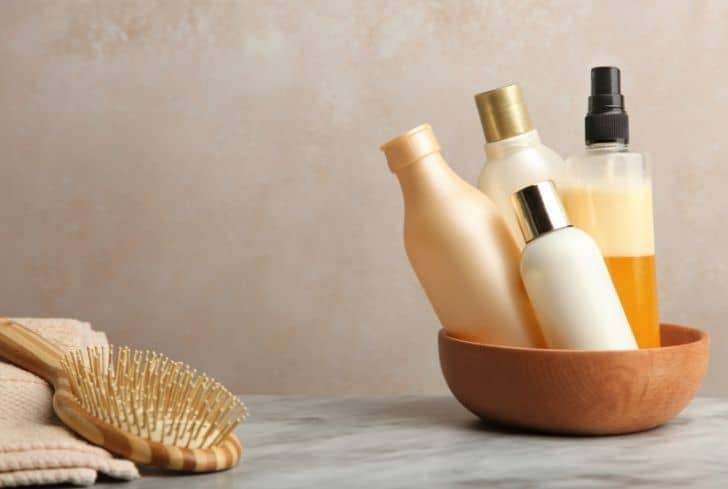Have you ever taken a curious peek at the ingredients on your shampoo bottle? If you have, then you must have come across silicone – it’s one of the ingredients that make your hair glossy and silky.
It’s so amazing that it waterproofs every strand, giving off that glossy sheen. It’s also responsible for keeping your hair tangle-free and slippery during your shower or hair appointment. Ultimately, silicone is a shampoo component that was designed to make your hair look healthy and mesmerizing.
But lately, some controversial issues have been raised regarding silicone in shampoo. For one, some believe that it could damage your hair in the long run. On the other hand, silicone may be bad for the environment.
It’s on your hair, so how does it affect the environment? When you wash it out of your hair, it goes down the drain. You know what happens from there, but we’ll talk more about it in this blog post. So, read on to find out the type of impact silicone has on the environment. Enjoy!
Is Silicone in Hair Products Bad For the Environment?
Everyone sure loves that glossy and silky feel that comes with a fresh wash. Shampoos also make your hair smooth and tangle-free, but what’s the component responsible for that?
Silicone!
While you love the effect it has on your hair, it may be unhealthy. After each scrub, the foamy residue goes down the drain. From there, it makes a long journey through the drainage system and to sewers.
From the sewers, the journey continues to our water bodies. Now, silicone won’t break down like some other materials, so the residue from your shampoo ends up in the water bodies, with the rest of our water waste.
Silicone may seem harmless, but it’s strong enough to harm our marine creatures and pollute our water bodies. As such, it’s best to avoid using hair products that contain silicone. There are better and more natural products that won’t have negative effects on the environment.
What is Silicone, and Why is it in Your Shampoo?
If you’ve seen some TV commercials marketing shampoo, you’ll be very familiar with hair mass that just shakes so mesmerizingly and falls perfectly over the model’s body.
Of course, you loved that and wanted it, so you headed over to the supermarket to buy that brand. You used it a couple of times and fell in love with the outlook it gives your hair.
Well, the major ingredient that may be responsible for that is silicone. It’s the go-to ingredient in the cosmetic and beauty industry for several reasons.
But first, let’s enlighten you on what silicone is. It’s also known as polysiloxane, and it’s a colorless and odorless polymer. It’s made from siloxane, which is essentially developed from the sand.
It’s a cheap additive that’s saturated the beauty and cosmetic industry because of its plastic-like nature. It can be used to achieve a range of results – hair silkiness, improvement in skin textures, and even improvement in wrinkles.
There’s also a variety of silicones, and each one has its advantages and disadvantage. However, our major concern is with the type that’s found in our shampoo. What’s its contribution to shampoo?
The type of silicone present in hair shampoo is called linear silicone, dimethicone, and it’s a large and porous silicone that makes each strand of hair on your head waterproof and silky.
Without it, it’s believed that your shampoo won’t give your hair a glossy and silky texture after each wash, but we’ll expand on that in subsequent sections.
Is Silicone Bad For Your Hair?
With the way silicone leaves our hair, it’s a bit difficult not to ignore the possible effects it could have in the long run. It’s a non-natural polymer, although it’s made from sand. Of course, regular consumption of non-natural materials will eventually have adverse effects, especially from everyday use like shampoos.
So, is silicone one of those materials? Is it bad for your hair? The straight answer is in the positive – silicone is bad for your hair.
5 Solid Reasons Why Silicone May be Bad For Your Hair
Here’s why silicone may be bad for your hair:
1. It Makes Your Head Heavy
Silicone is mostly hydrophobic, which means it’s a bit difficult to wash out a build-upbuild-up of this material. However, one of the endearing features of silicone is the waterproof outlook it gives your hair.
That way, you can have a good hair day all day. However, this puts you at a disadvantage in the long run. Silicone is a polymer, which is plastic-like, and it creates a layer over each strand of your hair.
It becomes difficult to wash out and also traps grease and dirt on each strand. So essentially, you get stuck with dirt, leading to a heavy head.
2. It Attracts Dirt
Silicone attracts dirt and grime and also leads to a build-up on your scalp. Aside from being a magnet for dirt, each time you wash your hair, an additional layer of silicone attaches itself to your hair and traps the dirt and grime.
It’s a vicious process that leaves your hair looking fry and brittle because there’s no space for other ingredients to pass through your hair and wash out the dirt.
3. It Can Lead to Scalp Irritation
You can get an itchy scalp from the frequent use of shampoo with silicone. However, if you can also attest to burning, irritation and even rashes, it could be because you frequently use a shampoo that contains silicone.
Another vicious cycle occurs when you try to wash your hair because you think these conditions could result from insufficient hair care. But of course, you’ll only be making matters worse.
4. It Can Lead to a Nutrient Deficiency
A shampoo that doesn’t contain silicone makes it easy for your other hair care products to provide the necessary nutrients for hair growth and health.
However, when your shampoo depends on silicone to give your hair that glossy and silky feel, it produces a non-permeable layer that keeps nutrients out. That way, it deprives your hair of the nutrients it needs for growth and vibrance.
It’ll also make your hair weak, which means you’ll likely regularly complain of hair breakage.
5. It Ultimately Results in Brittleness and Dryness
For those who don’t already know, the sheen and vibrancy that your hair always seems to have when using a silicone-based shampoo are false. It’s a false layer that traps every strand of your hair.
It prevents suds from getting to your hair, and of course, that results in brittleness and dryness. In addition, all the essential nutrients and oils in those suds won’t get to your hair, so you’ll simply waste money and still end up with unhealthy hair.
Is Silicone Biodegradable?
Silicone is a polymer, and it’s made of siloxane. It’s a versatile material that has several use cases. It’s similar to plastic, but we can’t exactly call it that.
It’s just as flexible, malleable, water-resistant, and of course, transparent. Some of these features are what make it a great shampoo ingredient.
Again, silicone is very similar to plastic, which means they have the same biodegradability features. But first, what is biodegradation, and why does the environment need it?
Technology and civilization have brought us this far, so life is much easier. However, these innovations aren’t beneficial to the environment because many of them are made from reinforced materials that don’t break down fast.
Before we got here, most materials we relied on were biodegradable; that is, they break down easily. However, biodegradation occurs under the right conditions, and material can break down within record time.
Of course, record time varies from one item to the other, but when the weather condition is perfect, there’s enough moisture and oxygen, and finally, microbes, a biodegradable material can’t resist decomposition.
But as we mentioned earlier, silicone and plastic are very similar. So, silicone also isn’t biodegradable – microorganisms have a hard time breaking it down. As such, the process is left to extreme weather conditions and time factors.
Silicone requires anywhere between fifty to five hundred years to break down properly. So, when you use it to wash your hair, it begins a long journey from your drainage to the environment.
It won’t break down, so it’ll be around for decades to centuries. It can withstand extreme weather conditions and a lot of pressure. As such, we have to rely on time factors to break it down for us.
That’s why it’s best to recycle your silicone materials when you can. However, in the case of shampoos, you certainly can’t recycle the silicone you wash down the drain. Instead, it’ll end up in the environment, inevitably.
So, it may be best to use shampoos that don’t contain silicone. Not only is it excellent for the environment, but it’s also best if you want healthy hair.
Is Silicone Compostable?
Have you ever tried composting? If you have a garden, then you’ll know what composting entails. First, the materials you put in your compost pile have to be capable of being broken down by microbes. Then, you’ll use the results to grow your plants and improve the texture and quality of your soil.
However, you can’t compost all your waste. That’s why there are other options like recycling, donating, upcycling, and throwing in the garbage can.
The materials you can compost need to be capable of being broken down within months, at most. Microbes will get to work once you expose them to moisture, oxygen, and the right temperature.
Now, you can compost your kitchen waste. The majority of it will break down within weeks. But you can’t compost materials like leftover meat, fish and bones, eggs, milk, butter, cooked and uncooked fat, among many others.
You also can’t compost silicone. This is because it’s been created in a manner that makes it highly resistant to extreme temperatures, and compost piles depend on the heat for decomposition.
It also doesn’t contain any nutrients that would benefit the soil or plants, so there’s no need to attempt to compost it.
Instead, you can dispose of it properly. In addition, you can recycle silicone repeatedly, so if you have any silicone item, simply inquire at your local recycling center if you can recycle it there.
If they don’t, you can send the item back to its manufacturer. They have numerous uses for it. For instance, they can break it down to a material that’s suitable for making lubricants.
Conclusion
It’s human nature to desire to be physically attractive. So, we resort to different ways to improve our physical appearance. Of course, you’ll pay enough attention to your hair; after all, that’s one of the first things people notice when they look at you.
However, some hair products like shampoo contain silicone, which improves hair sheen. But again, silicone may be bad for the environment because it’s not biodegradable.






